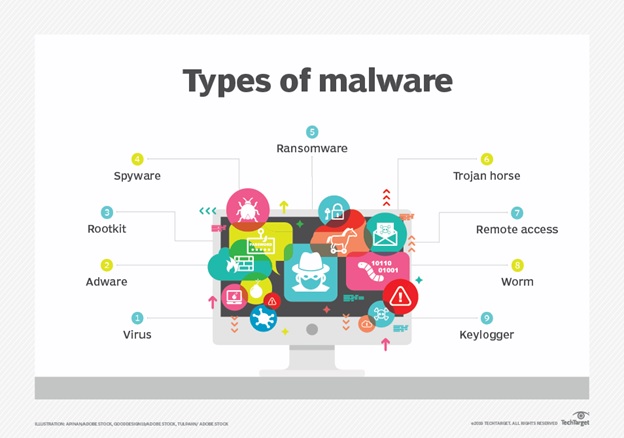What’s All the Hype Around Cyber Security
The current COVID-19 pandemic has made remote working a new normal for companies around the world. It is estimated that almost 44% of US employees have been working from home 5 days or more per week during the COVID-19 pandemic. While this has allowed for employees to continue working, it has also made the networks and servers vulnerable to several threats, especially to malware.
Malware has different types and each works in different ways. If you frequently use email, social media, and the internet, you and your business may be at great risk for a malware attack.
Some Common Types of Malware
Here are some types of malware in a nutshell:
- Virus: It is a piece of code that is capable of copying itself and typically corrupts the system or destroys data on the device.
- Worm: It searches for files such as address books or email addresses and uses them to send infected messages. It can mimic the email it came from and makes users think they got an email from a known source.
- Rootkit: It provides attackers with administrator-level access to the system.
- Adware: It collects data and provides users with appropriate advertisements.
- Spyware: It typically installs on the device without you even knowing. It is capable of changing the configuration of the device or gathering advertising data and personal information.
Growing Threat of Malware Attacks
There is no denying the fact that businesses are becoming more dependent on the internet. They have to access multiple devices from different networks and it makes the system vulnerable to malware. It can usually infiltrate devices without the permission of the owner.
The purpose of a malware attack is usually to:
- Spy and collect information from the system
- Trigger pop-up ads
Destroy the device/system
The incidents of cyberattacks have grown exponentially over the years, with malware usually being the most expensive one. Their cost to businesses had increased by 11% in 2018 from the previous year and reached over US$ 2.6 million per company, on average. Such attacks are a severe threat to any business. They can hamper the security infrastructure of a system and potentially cause many security issues.
Major Impacts of Malware on Businesses
Here are some of the major impacts of malware attacks on businesses:
1. Interrupt Business Operations
Malware is capable of degrading the network performance and breaking down the network. It can also disable some important services offered by businesses in some cases. Thus, it can affect the business operations and cause huge losses to the owners.
Even small businesses are not safe from cyberattacks. The average cost of cyberattacks for small businesses had increased from 8,699 dollars per attack in 2013 to $20,752 per attack in 2014. That is why businesses should hire experts that use the latest technologies to block data intrusions and eliminate such attacks before they enter their network.
2. Theft of Personal Information/Identity
Malware can enter your system without your approval through emails or downloads. It can collect your personal information, including running background and recording every activity. For instance, malware can monitor your browsing history and applications to copy personal information such as user IDs, passwords, bank account details, etc.
Once it gets your information, it can also send spam e-mails to other connected devices in your business. That is why you should maintain IT security compliance for your business as per the industry and government regulations.
3. Access Sensitive Information
Apart from the personal information of your employees, malware can also access the sensitive information of your business by entering the servers. It may even lead to hardware failure in some cases. This can be a cause of major embarrassment in the market and you may lose the trust of your customers.
A malware or virus can enter your system and go unnoticed as it can hide in the system in different ways. Since a malware attack can be hostile, intrusive, and destructive, you need to protect your system at all times. You can use malicious software removal tools or hire professionals for the security and maintenance of your server at all times.
Related posts
Sidebar
Recent Posts
The Rise of Legal Tech Startups: What Law Firms Need to Know
Introduction The legal profession, often rooted in tradition and resistant to change, faces a technological revolution. Legal tech startups are…
Shiba Inu vs. Dogecoin: The Battle of the Meme Coins
In the realm of cryptocurrency, there has been an ongoing battle between two popular meme coins, Shiba Inu and Dogecoin….




Review What’s All the Hype Around Cyber Security?.